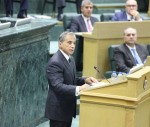You are here
Several considerations at play
Apr 21,2014 - Last updated at Apr 21,2014
Judging by the continuous deterioration of the situation in east Ukraine, the meeting held by the US, Russia, EU and Ukraine in Geneva last week did not live up to earlier expectations that the conference would reduce tension between Moscow and Western capitals.
Some 40,000 Russian troops continue to be deployed along the eastern borders of Ukraine and pro-Russian groups are still barracking themselves in Ukrainian state building in several cities in eastern Ukraine.
The Geneva meeting called for easing tension and disarming the pro-Russian separatists, but nothing of the sort happened.
Each side is adamant, sticking to its position. Moscow appears to be unyielding on its ambitions in eastern Ukraine.
Russian President Vladimir Putin’s uncompromising position has been strengthened by his success in annexing Crimea to the Russian Federation with impunity, with no real opposition from the West.
Kiev is considering a new approach to solve the conflict with Moscow, aiming to give ethnic Russians in the east of the country more autonomy and show greater respect to their linguistic and cultural rights.
This could be the opening for a resolution of the conflict in eastern Ukraine, especially since such a path would be consistent with international norms, especially those related to minority rights.
A recent poll published in Ukraine suggests that more than 50 per cent of the Russian-speaking Ukrainians do not want a complete separation from Kiev.
The majority of those polled simply want more autonomy and to enjoy minority rights.
Ukrainians, whether in the east or the west, no doubt think of the possibility of joining the EU. Such membership would give them opportunities that would be denied them if they were to break away from Kiev.
That is a real dilemma for Ukrainians, including ethnic Russians.
It will be interesting to see how it is sorted out.












